Platform Review: HBO Max
Should you subscribe? Plus: 20 good movies if you do.
This is the second in an occasional series of what I’m calling platform reviews, where I take a look at all the films a streaming service has to offer and gauge the depth and breadth of its programming. The first, back in August, was devoted to Netflix, since that’s the service that just about everyone has – with 214 million subscribers worldwide, it’s the base on which we build our entertainment consumption in the streaming era. Amazon Prime Video is the second most popular platform, with 175 million subscribers, but where Netflix is actually pretty paltry when it comes to feature films, Amazon is the opposite – if you’re looking for a streaming movie, you can probably rent it for $2.99 on the service. Everything’s there in an uncurated hodgepodge.
HBO Max has “only” 45 million subscribers, with many of them getting the service free as part of an AT&T cellphone plan, but it may have the highest quality content of any streaming platform short of the Criterion Channel. It’s telling that when I updated my Netflix overview last week, I heard from a number of readers asking me to tackle HBO Max next – but no similar requests for other streamers. Well, okay then: Here’s a breakdown of what the service has to offer, whether it’s worth your money, and what cinematic gems might be squirreled away in the corners.
First, how is HBO Max different from HBO – or HBO Go, or HBO Now? The second two were the company’s previous Video On Demand services, and both were folded into HBO Max in 2020. HBO still exists as a linear premium channel available through your cable provider and you can get HBO as a stand-alone streaming service for $14.99 a month – but that makes no sense when HBO Max offers a great deal more for the same price. (There’s also a $9.99 monthly HBO Max plan which is supported by ads and doesn’t allow access to new theatrical movies.)
HBO Max represents Warner Bros.’ horse in the streaming-platform race, competing with Disney+, Paramount+, and Peacock (NBCUniversal) as the studios —or their corporate parents, AT&T in the case of both HBO and Warner Bros. — jockey for dominance in the lucrative new world of subscription VOD. Accordingly, the premium plan allows you to watch new-release Warner Bros. movies like “Dune,” “King Richard,” and the upcoming “The Matrix Resurrections” at no extra charge the day they arrive in theaters. Since Warner’s produces the superhero movies based on characters from DC Comics (also owned by AT&T), almost every film and TV iteration of Batman, Superman, Wonder Woman, and the rest are available to stream on HBO Max, with a few outliers like the 1960s Adam West TV “Batman” streaming on satellite provider DirecTV – another AT&T holding. You can rent all these films and shows elsewhere, but they’re free with an HBO Max subscription.
Ty Burr’s Watch List is a reader-supported newsletter. Both free and paid subscriptions are available. Those who want to support my work are encouraged to take out a paid subscription.
Obviously, you get exclusive unlimited access to HBO’s original TV series, including hits like “Game of Thrones,” “Curb Your Enthusiasm,” “Succession,” and “The Sopranos,” as well as cult shows like “High Maintenance” and “How To with John Wilson.” But HBO Max has a refreshingly deep selection of feature films as well, with a varied array of classics and recent releases, mainstream movies and art-house fare. In fact, because of an arrangement with Janus Films, the service functions almost as a Criterion Channel Lite, with a groaning board of foreign-film classics from Ingmar Bergman, Akira Kurosawa, Federico Fellini, and many more. HBO Max has exclusive rights to the Studio Ghibli catalogue, so the great animated films of Hayao Miyazaki and his colleagues – “My Neighbor Totoro,” “Princess Mononoke,” “Spirited Away,” et al. – can only be found here.
What else can you find for the price of a monthly subscription that you’d have to rent individually elsewhere? All the Mel Brooks movies. All the original “Planet of the Apes” movies. All the Jason Bourne movies. All the “Pink Panther” movies. Everything Godzilla (including the Toho Studios originals) and everything Kong Kong. All the “Lethal Weapon”s and all the “Mad Max”s and all the “Matrix”s (“Matrices”?) “Police Academy” comedies and “Rocky” dramas ad infinitum. Three versions of “A Star Is Born” (only the 1937 Janet Gaynor/Fredric March original is AWOL). The “Oceans” films and “Lord of the Rings.” Legendary documentaries like “Don’t Look Back,” “Harlan County USA,” and “Hoop Dreams.”
HBO Max goes wide if not deep on classics, through an arrangement with Turner Classic Movies (owned by, you guessed it, AT&T). The entire Warner Bros. backlist is theoretically available, as well as MGM’s pre-1950 output, Samuel Goldwyn productions, and all of RKO’s catalogue. The Criterion connection means that most of Charlie Chaplin’s and Harold Lloyd’s feature comedies are here. (Buster Keaton’s oeuvre is all over the place but can generally be found at Kanopy, the public-library streaming platform.) All that’s missing is a dedicated “Classics” subsection – you have to troll through the Comedy and Drama and International offerings to find the golden oldies. Few surprises here but plenty of 4-star warhorses, from “Citizen Kane” to “The Philadelphia Story” to “The Red Shoes” to “North by Northwest.” And, as mentioned above, the foreign classics roster is especially impressive. But they could go a lot further into the libraries than they have: Eight classic MGM musicals is a start, but only a start.
Add to that unlimited access to HBO’s library of original series and movies, and HBO Max represents a good deal, especially if you have an AT&T phone contract that gives you the service for free. If not, you need to decide whether you need it on top of what for many consumers are the two must-have services, Netflix and Amazon Prime Video. Someday, the platform wars may be over and we’ll find ourselves paying for only one or two VOD services. Until then, HBO Max represents a worthy additional tier for movie lovers and binge-TV viewers.
Here are 20 unexpected goodies I found in my crate-dive of the roughly 2,330 movies on HBO Max.
Blue Ruin (2013) An emotionally damaged man comes home to wreak unholy vengeance on his family in Jeremy Saulnier’s stunning debut film.
Carnival of Souls (1962) An eerie no-budget drive-in classic from one-shot feature director Herk Harvey, this was rediscovered to acclaim in the 1980s.
Cronos (1993) A work of visionary pulp that announces the arrival of a young filmmaker named Guillermo del Toro.
Eight Men Out (1988) John Sayles’ achingly good Chicago Black Sox drama, with a deep bench of stars.
Danny Collins (2015) Odd, minor, but very charming Al Pacino comedy-drama in which he’s an aging rock star at a crossroads. Added inducements: Annette Bening and Bobby Cannavale.
Eating Raoul (1982) Wonderful downtown cannibal comedy from the days when transgression really meant something. Featuring the sublime Mary Woronov.
House (1977) Demented Japanese horror comedy about schoolgirls in a haunted house, this is as Dada as movies get. Must be seen to be believed.
Ice Station Zebra (1968) “Alistair MacLean” – two words that can turn men of a certain age (i.e., me) back into ten-year-old boys rapt on the rug in front of a Saturday TV matinee.
Ingrid Bergman: In Her Own Words (2015) A fine primary-source documentary about a great and wayward movie star, with narration from her letters and diaries and input from daughters Isabella Rossellini and Pia Lindstrom.
Lone Wolf and Cub movies (1972 – 1974) A lone samurai wanders medieval Japan with his toddler son in a baby cart full of weaponry. All six in the classic series are available on the service.
Lucky (2017) That Harry Dean Stanton movie I kvelled about several months ago.
Muriel’s Wedding (1994) Introducing a young Australian actress named Toni Collette in a cheeky bridal revenge comedy.
Le Samouraï (1967) Jean Pierre Melville made existential crime films, none better than this Alain Delon classic.
Smithereens (1982) Another scrappy 1980s New York indie (see “Eating Raoul,” above), from newbie director Susan Seidelman (“Desperately Seeking Susan”). Bonus points for introducing me to The Feelies (heard in the trailer).
The Tale (2018) This devastating drama about a filmmaker (Laura Dern) coming to grips with her long-ago abuse went straight to HBO and slipped under everyone’s radar.
Talk To Me (2007) A great showcase for the great Don Cheadle as 1960s D.C. deejay and activist Petey Greene.
Two English Girls (1971) Francois Truffaut’s revisit to “Jules and Jim” territory, from the same novelist and with the sexes reversed (and apparently closer to the actual events). Some people prefer this to the earlier film. Okay, I do.
The Way Way Back (2013) A delightful summer comedy about a teenage boy’s coming-of-age, set at a Buzzard’s Bay water park run by Sam Rockwell. Steve Carrell plays Mom’s jerk of a new boyfriend.
World’s Greatest Dad (2009) Pity the poor souls stumbling on this Robin Williams movie thinking they’re in for a comedy. Instead it’s a daringly dark satiric drama about a grieving father who makes some terrible choices.
Wristcutters: A Love Story (2006) Awful title, good little movie. It’s set in a desert limbo where the souls of suicides go while they wait for judgement. Except newcomer Patrick Fugit knows someone somewhere made a mistake. Tom Waits plays God, I think.
If you enjoyed this edition of Ty Burr’s Watch List, please feel free to share it with friends.
If you’re not a paying subscriber and would like to sign up for additional postings and to join the discussions, here’s how:
If you’re already a paying subscriber, I thank you for your generous support.







